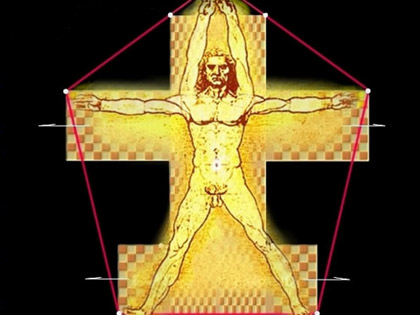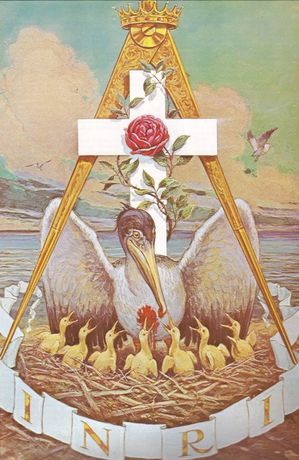Of Roses and Crosses...
Sept 2, 2013 22:21:26 GMT
Post by Goldenfleeced on Sept 2, 2013 22:21:26 GMT
The Rosicrucian Order was founded in 1407 by one Christian Rosenkreutz, whose identity is unknown, really, except that some have pointed to the mysterious Comte de Germain as the alter-ego of the equally mysterious Rosenkreutz, or 'Rosy-Cross'.
As a group of alchemists, their most sought after goal was the Philosopher’s stone, a legendary alchemical tool, supposedly capable of turning base metals into gold; it was also sometimes believed to be an elixir of life, useful for rejuvenation and possibly for achieving immortality. In early Christian lore, the philosopher's stone was carried by Eve out of the Garden of Eden, implying that it is one and the same as the forbidden fruit of the tree of knowledge of good and evil.
The Philosopher’s stone is to be found in the “Interior parts of the Earth”, according to the alchemical motto VITRIOL: "Visita Interiora Terrae Rectificando Invenies Occultum Lapidem ("Visit the Interior Parts of the Earth; by Rectification Thou Shalt Find the Hidden Stone.").
The Rosicrucians claimed to have visited this place and obtained the precious treasure.
In a little work called Lumen de Lumine, or A New Magical Light Discovered and Communicated to the World, published in London in 1651, by Eugenius Philalethes, we find a remarkable letter, presumably from the Rosicrucian Order titled "A Letter from the Brothers of R. C. Concerning the Invisible, Magical Mountain, And the Treasure therein Contained."

A short excerpt of the letter is as follows:
"There is a mountain situated in the midst of the earth, or center of the world, which is both small and great. It is soft, also above measure hard and stony. It is far off, and near at hand, but by the providence of God, invisible. In it are hidden most ample treasures, which the world is not able to value.
Near the daybreak there shall be a great calm, and you shall see the Day-Star arise and the dawning will appear, and you shall perceive a great treasure. The chiefest thing in it, and the most perfect, is a certain exalted tincture, with which the world (if it served God and were worthy of such gifts) might be tinged and turned into most pure gold.
This tincture being used will make you young when you are old, and you shall perceive no disease in any part of your bodies. By means of this tincture also you shall find pearls of that excellency which cannot be imagined."
shugborough.info/chapters.php?id=3
Small in greatness, and great in smallness... I believe that comes from the book of Enoch. I always liked it, anyway...
and look in the forefront of the 'Temple'... I see the 'knight' from the 'Ninth Gate' illustrations... the symbolism here is quite deliberate, and worthy of contemplation for those who would undertake the 'work.'

As a group of alchemists, their most sought after goal was the Philosopher’s stone, a legendary alchemical tool, supposedly capable of turning base metals into gold; it was also sometimes believed to be an elixir of life, useful for rejuvenation and possibly for achieving immortality. In early Christian lore, the philosopher's stone was carried by Eve out of the Garden of Eden, implying that it is one and the same as the forbidden fruit of the tree of knowledge of good and evil.
The Philosopher’s stone is to be found in the “Interior parts of the Earth”, according to the alchemical motto VITRIOL: "Visita Interiora Terrae Rectificando Invenies Occultum Lapidem ("Visit the Interior Parts of the Earth; by Rectification Thou Shalt Find the Hidden Stone.").
The Rosicrucians claimed to have visited this place and obtained the precious treasure.
In a little work called Lumen de Lumine, or A New Magical Light Discovered and Communicated to the World, published in London in 1651, by Eugenius Philalethes, we find a remarkable letter, presumably from the Rosicrucian Order titled "A Letter from the Brothers of R. C. Concerning the Invisible, Magical Mountain, And the Treasure therein Contained."

A short excerpt of the letter is as follows:
"There is a mountain situated in the midst of the earth, or center of the world, which is both small and great. It is soft, also above measure hard and stony. It is far off, and near at hand, but by the providence of God, invisible. In it are hidden most ample treasures, which the world is not able to value.
Near the daybreak there shall be a great calm, and you shall see the Day-Star arise and the dawning will appear, and you shall perceive a great treasure. The chiefest thing in it, and the most perfect, is a certain exalted tincture, with which the world (if it served God and were worthy of such gifts) might be tinged and turned into most pure gold.
This tincture being used will make you young when you are old, and you shall perceive no disease in any part of your bodies. By means of this tincture also you shall find pearls of that excellency which cannot be imagined."
shugborough.info/chapters.php?id=3
Small in greatness, and great in smallness... I believe that comes from the book of Enoch. I always liked it, anyway...
and look in the forefront of the 'Temple'... I see the 'knight' from the 'Ninth Gate' illustrations... the symbolism here is quite deliberate, and worthy of contemplation for those who would undertake the 'work.'






